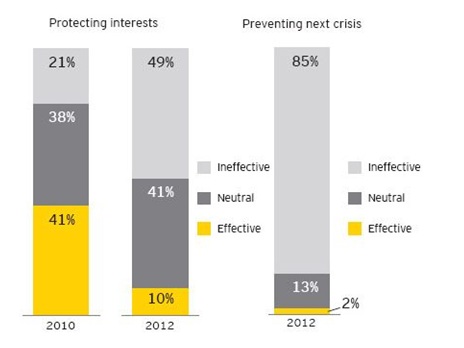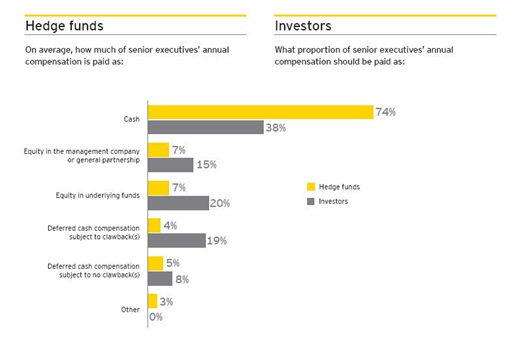A new report, Finding Common Ground, prepared by the auditing/accounting giant Ernst & Young in conjunction with Greenwich Associates, indicates that investors and managers are drifting apart on a range of issues: among these managerial compensation, selection, and redemption criteria.
The report also indicates that investors are quite skeptical about the effectiveness of regulation.
This is Ernst & Young’s sixth annual survey of the global hedge fund market. On E&Y’s behalf, Greenwich Associates asked questions of 100 hedge fund managers, with total assets under management of more than $710 billion, and 50 institutional investors.
One of the questions asked the latter group was: how effective do you believe are contemporary regulations? The issue of effectiveness was broken down into two parts: do regulations protect your interests as investors? And, will they help prevent the next crisis?
As this chart indicates, only a sliver of investors (2 percent) believe that regulation is effective in preventing the next crisis. Indeed, even the number of those who are neutral on that point is smallish, because a full 85 percent see regulations as ineffective for that purpose.
Skepticism is not quite so intense on the matter of the value of regulations in protecting investors, but even here, nearly five times as many investor respondents think it ineffective as think it effective. Furthermore, skepticism has increased over the last two years – that is, over the period since the passage of the Dodd-Frank Act in the U.S.
The report quotes one North American investor saying: “Regulations are basically meant to solve last year’s wars.” It also quoted an EMEA hedge fund noting that regulation has forced it to register in a number of jurisdictions worldwide, “even where we don’t have a physical presence.”
Compensation
Managerial and investor attitudes are far apart on the question of how the former should be compensated.
The managers of hedge funds (by 87 percent affirmative to 13 neutral and 0 percent contrary) believe that their current compensation system aligns their performance with the interests of their investors. But only 42 percent of investors believe that it does so. Forty four percent say they are neutral on the subject, and a small but still healthy slice of investors, 14 percent, say outright that interests are not aligned.
More specifically, the two sides of the table differ on the use of cash payments. Managers report as the above graph indicates that 74 percent of their compensation is in cash. Investors think that number should be cut nearly in half, to 38 percent.
E&Y writes, “It is unlikely that this gap will be closed in the near future,” in part because the sort of tax structures that facilitate “mutually beneficial” structures have been prohibited or diminished of late.
Redemptions
Another split is this: hedge fund managers may not be on top of how their investors are thinking about redemptions.
Asked which two or three factors (aside from those under the control of management itself) are the most likely triggers for redemption, both managers and investors unsurprisingly named performance more than any other single trigger.
But the second most commonly named trigger among investors was a “change in key personnel” at the hedge fund. Eighty-four percent of those asked included this among their “two or three” factors, nearly as many as those (82 percent) who said “performance.” Investors see themselves as having invested with a particular team, perhaps with one or a small number of "stars." Managers themselves don’t see this as a likely trigger.
Finally, managers don’t quite grok the way in which investors chose managers. Managers think their own past performance is what will get them selected whereas investors seem to have internalized the wise and oft-repeated axiom that past performance is no guarantee of future results. Investors evaluate the hedge fund management team itself (hence the difference over redemptions noted above). They are also keen to look at a hedge fund’s risk management policies and oversight as part of their due diligence.
Transparency, on portfolio holdings and on performance attribution, is a bigger issue for investors making their fund selections than managers have yet come to understand.
- English (UK)
- English (India)
- English (Canada)
- English (Australia)
- English (South Africa)
- English (Philippines)
- English (Nigeria)
- Deutsch
- Español (España)
- Español (México)
- Français
- Italiano
- Nederlands
- Português (Portugal)
- Polski
- Português (Brasil)
- Русский
- Türkçe
- العربية
- Ελληνικά
- Svenska
- Suomi
- עברית
- 日本語
- 한국어
- 简体中文
- 繁體中文
- Bahasa Indonesia
- Bahasa Melayu
- ไทย
- Tiếng Việt
- हिंदी
Ernst & Young On Investor/Manager Splits
Published 11/26/2012, 01:00 AM
Updated 07/09/2023, 06:31 AM
Ernst & Young On Investor/Manager Splits
3rd party Ad. Not an offer or recommendation by Investing.com. See disclosure here or
remove ads
.
Latest comments
Install Our App
Risk Disclosure: Trading in financial instruments and/or cryptocurrencies involves high risks including the risk of losing some, or all, of your investment amount, and may not be suitable for all investors. Prices of cryptocurrencies are extremely volatile and may be affected by external factors such as financial, regulatory or political events. Trading on margin increases the financial risks.
Before deciding to trade in financial instrument or cryptocurrencies you should be fully informed of the risks and costs associated with trading the financial markets, carefully consider your investment objectives, level of experience, and risk appetite, and seek professional advice where needed.
Fusion Media would like to remind you that the data contained in this website is not necessarily real-time nor accurate. The data and prices on the website are not necessarily provided by any market or exchange, but may be provided by market makers, and so prices may not be accurate and may differ from the actual price at any given market, meaning prices are indicative and not appropriate for trading purposes. Fusion Media and any provider of the data contained in this website will not accept liability for any loss or damage as a result of your trading, or your reliance on the information contained within this website.
It is prohibited to use, store, reproduce, display, modify, transmit or distribute the data contained in this website without the explicit prior written permission of Fusion Media and/or the data provider. All intellectual property rights are reserved by the providers and/or the exchange providing the data contained in this website.
Fusion Media may be compensated by the advertisers that appear on the website, based on your interaction with the advertisements or advertisers.
Before deciding to trade in financial instrument or cryptocurrencies you should be fully informed of the risks and costs associated with trading the financial markets, carefully consider your investment objectives, level of experience, and risk appetite, and seek professional advice where needed.
Fusion Media would like to remind you that the data contained in this website is not necessarily real-time nor accurate. The data and prices on the website are not necessarily provided by any market or exchange, but may be provided by market makers, and so prices may not be accurate and may differ from the actual price at any given market, meaning prices are indicative and not appropriate for trading purposes. Fusion Media and any provider of the data contained in this website will not accept liability for any loss or damage as a result of your trading, or your reliance on the information contained within this website.
It is prohibited to use, store, reproduce, display, modify, transmit or distribute the data contained in this website without the explicit prior written permission of Fusion Media and/or the data provider. All intellectual property rights are reserved by the providers and/or the exchange providing the data contained in this website.
Fusion Media may be compensated by the advertisers that appear on the website, based on your interaction with the advertisements or advertisers.
© 2007-2024 - Fusion Media Limited. All Rights Reserved.
